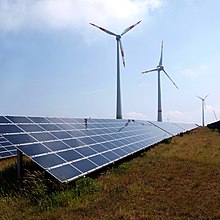
Back التحول في الطاقة Arabic Energiewende Czech Energiewende in Deutschland German Energiewende Spanish Energiaátmenet Németországban Hungarian Energiewende di Jerman ID Energietransitie in Duitsland Dutch Энергетический поворот Russian Energiewende Ukrainian 能量过渡计划 Chinese

The Energiewende (German for 'energy turnaround') (pronounced [ʔenɐˈɡiːˌvɛndə] ⓘ) is the ongoing energy transition by Germany. The new system intends to rely heavily on renewable energy (particularly wind, photovoltaics, and hydroelectricity), energy efficiency, and energy demand management.
Legislative support for the Energiewende was passed in late 2010 and included greenhouse gas (GHG) reductions of 80–95% by 2050 (relative to 1990) and a renewable energy target of 60% by 2050.[1] Germany had made progress on its GHG emissions reduction target before the introduction of the program, achieving a 27% decrease between 1990 and 2014. The Country would need to maintain an average GHG emissions abatement rate of 3.5% per year to reach its Energiewende goal, equal to the maximum historical value.[2] Germany's energy mix has a high CO2 intensity due a significant coal and fossil gas usage.[3]
Germany phased out nuclear power in 2023 as part of the Energiewende,[4] and plans to retire existing coal power plants possibly by 2030, and latest by 2038.[5][6] By 2023 the early retirement of the Country's nuclear reactors was no longer supported by the general public[7] and the plan was controversial between energy experts, fearing that it could have a negative impact on Germany's goals to reduce greenhouse gas emissions.[8]
- ^ The Energy of the Future: Fourth "Energy Transition" Monitoring Report — Summary (PDF). Berlin, Germany: Federal Ministry for Economic Affairs and Energy (BMWi). November 2015. Retrieved 2017-11-18.
- ^ Hillebrandt, Katharina; et al., eds. (2015). Pathways to deep decarbonization in Germany (PDF). Sustainable Development Solutions Network (SDSN) and Institute for Sustainable Development and International Relations (IDDRI). Archived from the original (PDF) on 2016-09-09. Retrieved 2016-04-28.
- ^ "Atomkraftwerke in Deutschland". Bundesministerium für Umwelt, Naturschutz, nukleare Sicherheit und Verbraucherschutz (in German). Archived from the original on 2022-03-24. Retrieved 2022-03-26.
- ^ "Kernkraft". Archived from the original on 2020-11-30. Retrieved 2020-12-26.
- ^ "Bund und Länder einigen sich auf Stilllegungspfad zum Kohleausstieg". Bundesregierung. 2020-01-16.
- ^ "What does the coalition deal mean for renewables, coal and the power market in Germany?". Clean Energy Wire. 2021-12-08. Retrieved 2024-07-04.
- ^ "Majority of Germans against nuclear phaseout: Survey". www.aa.com.tr. Retrieved 2025-01-20.
- ^ "Reflections on Germany's nuclear phaseout - Nuclear Engineering International". www.neimagazine.com. Archived from the original on 2020-06-09. Retrieved 2020-05-28.